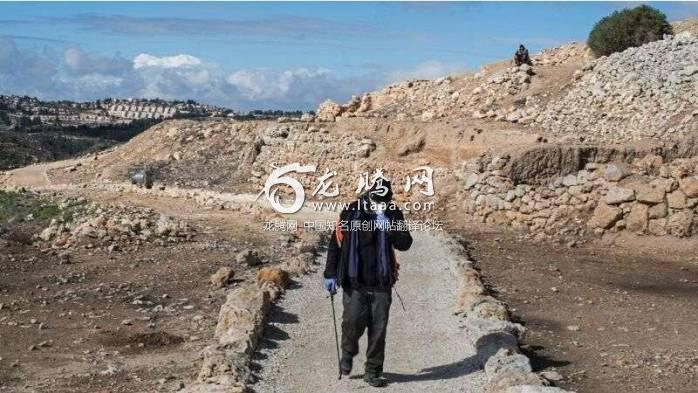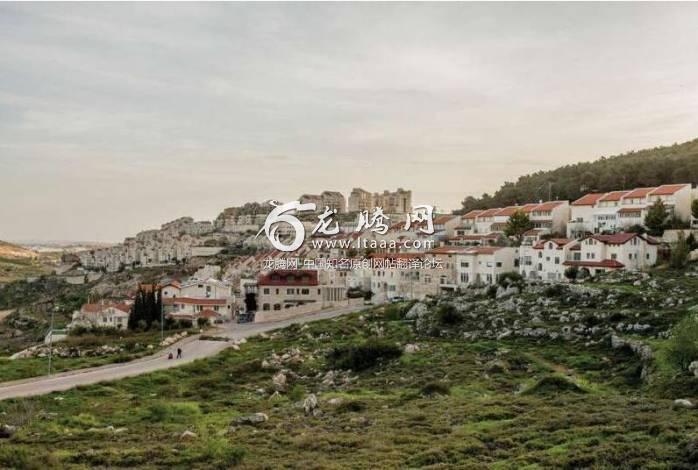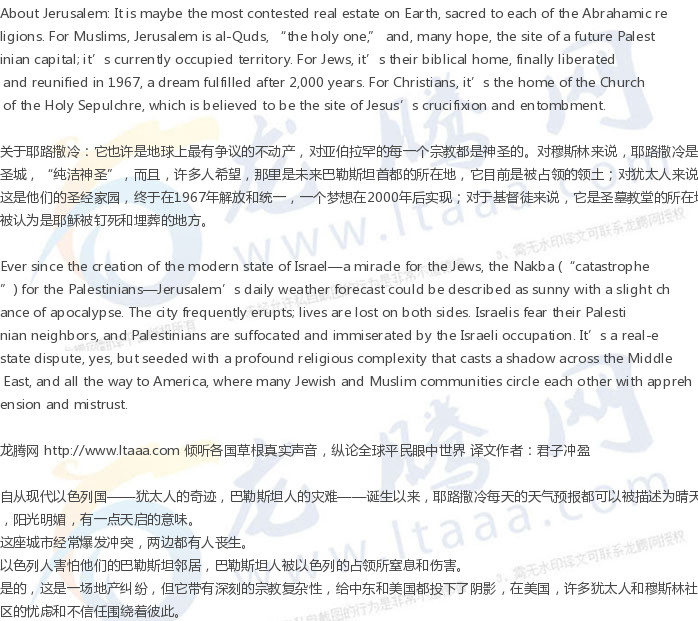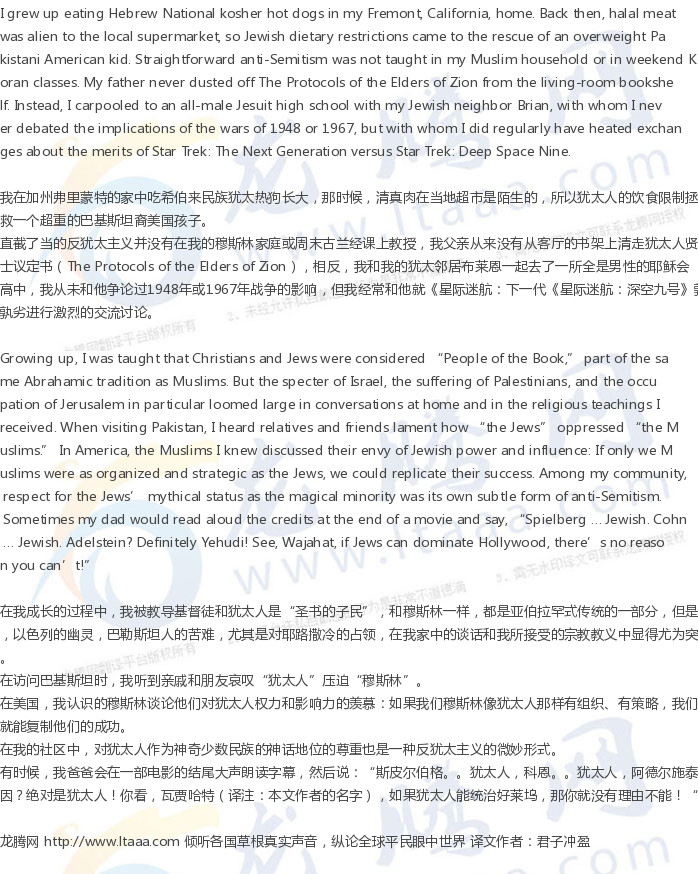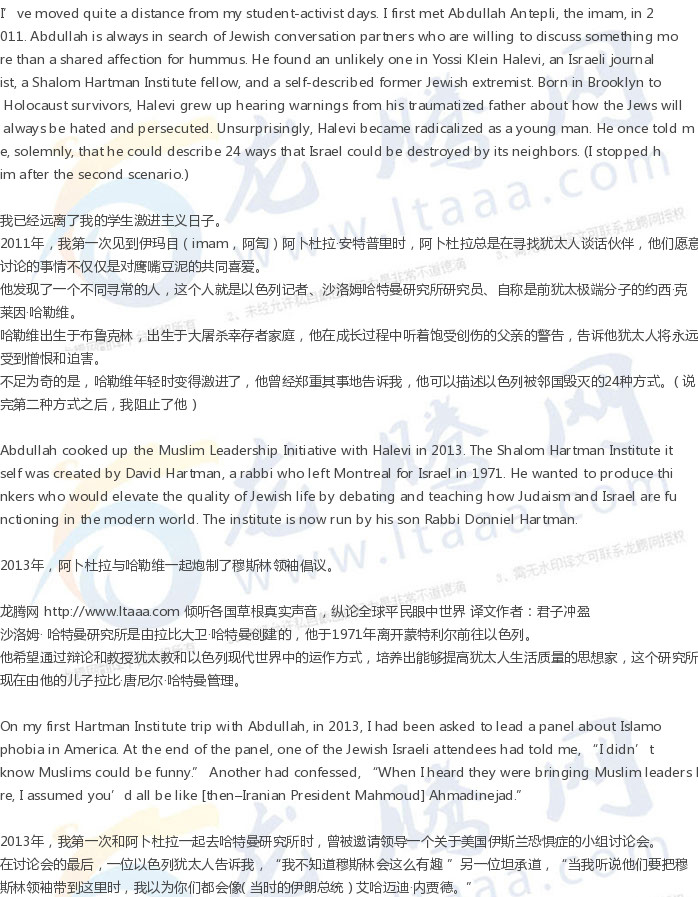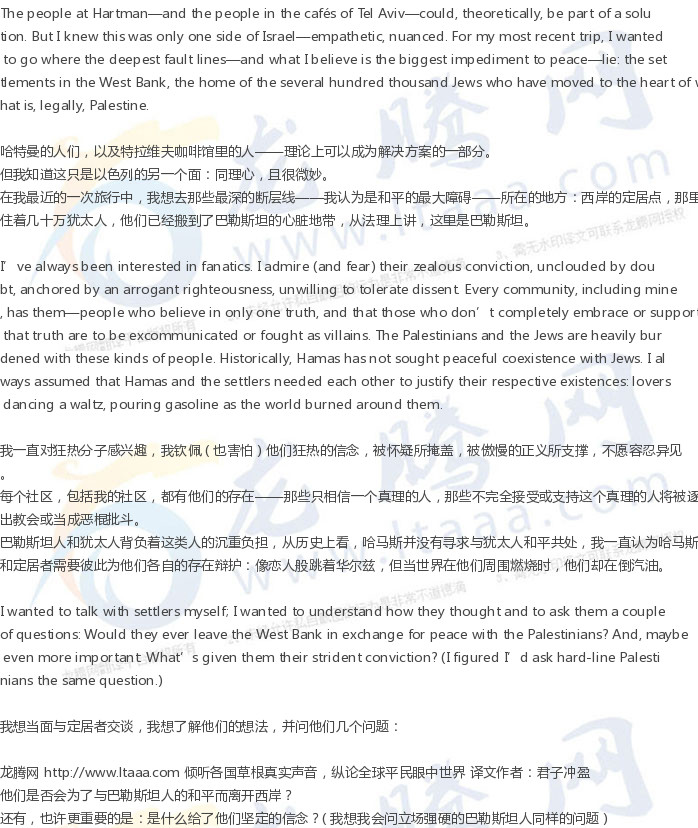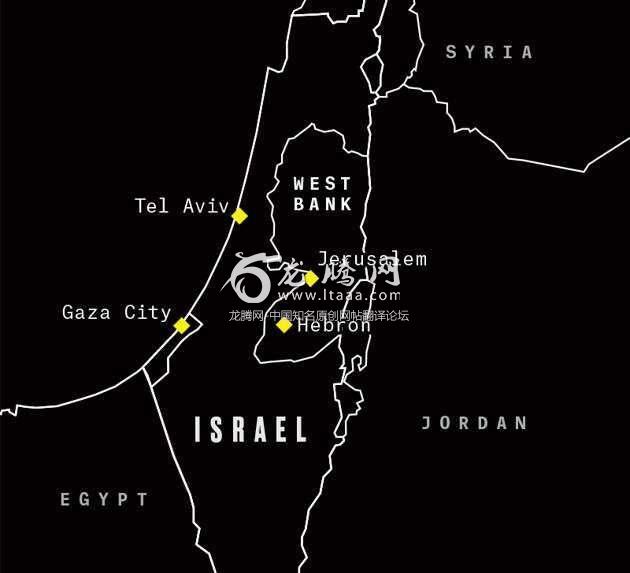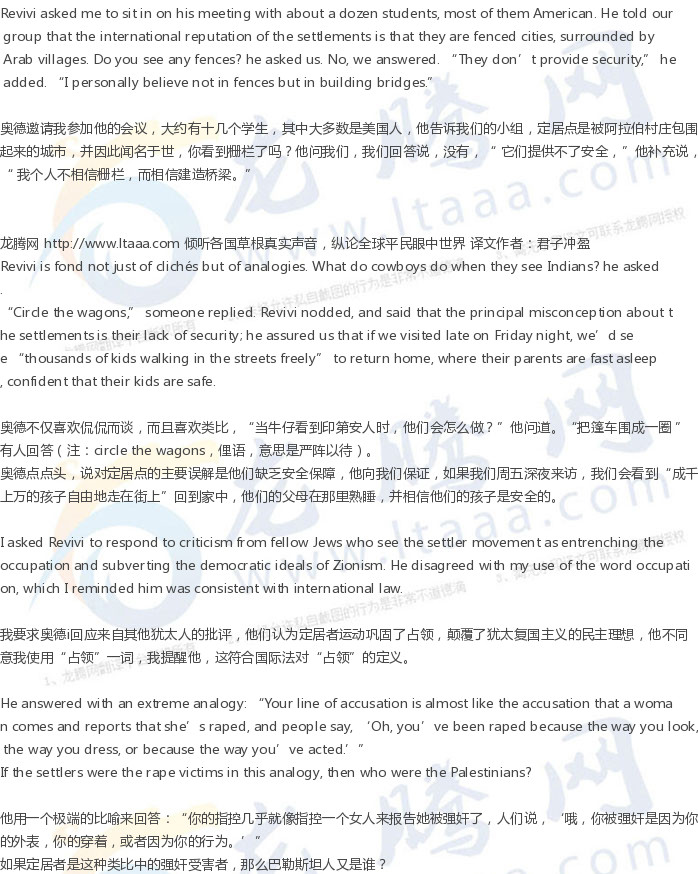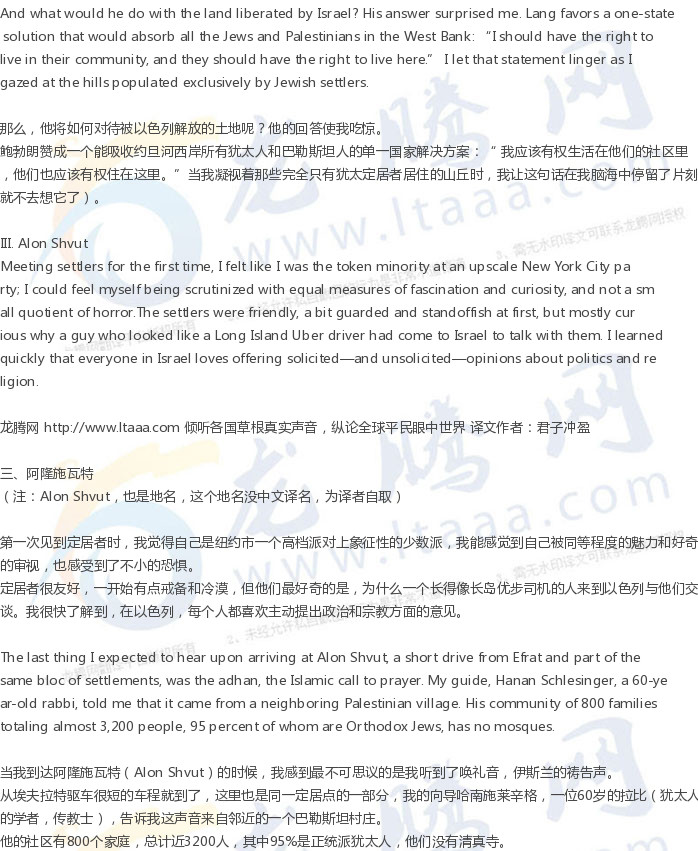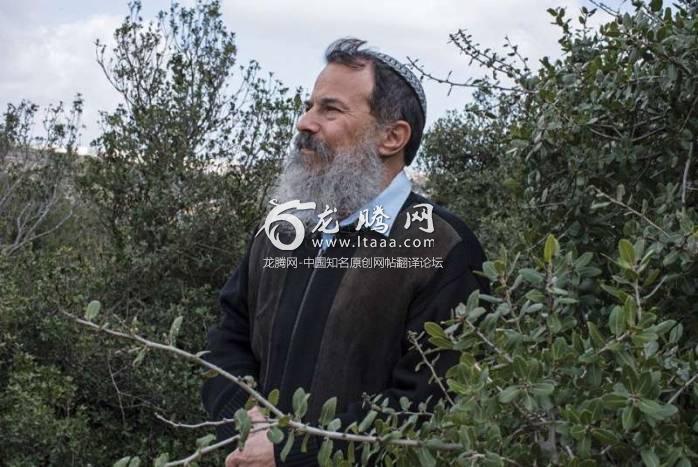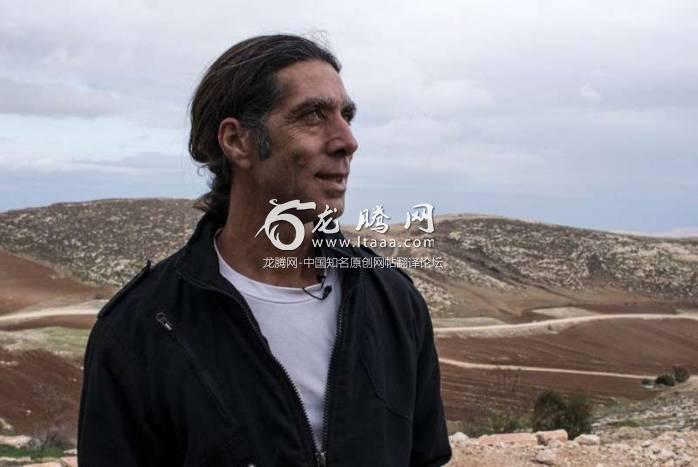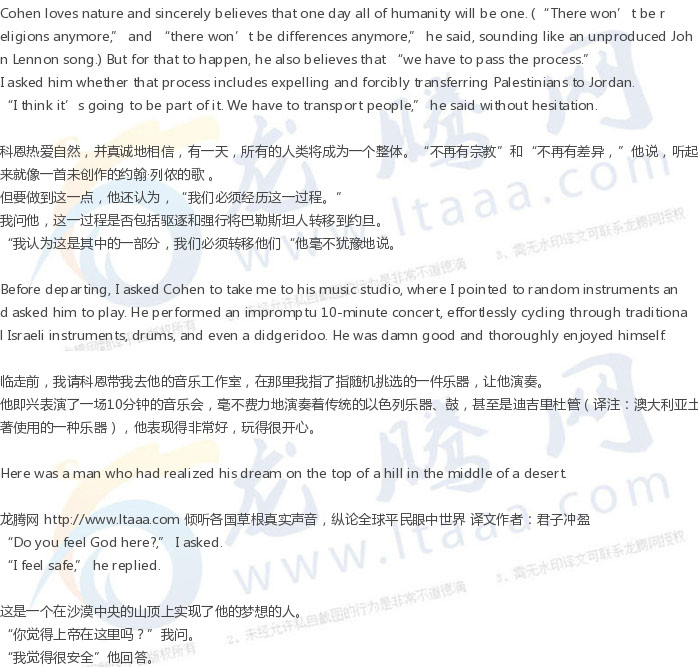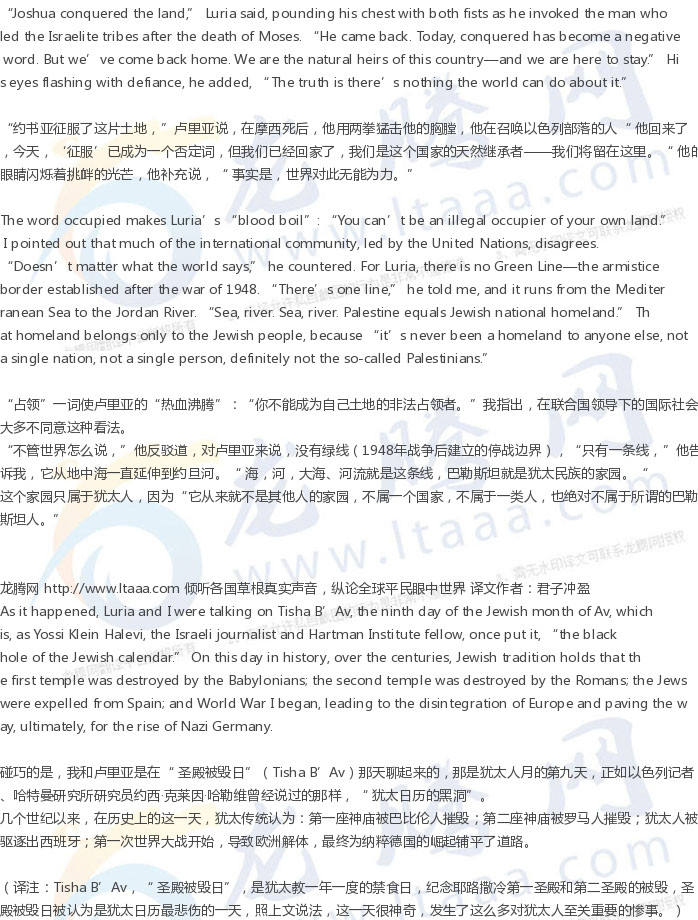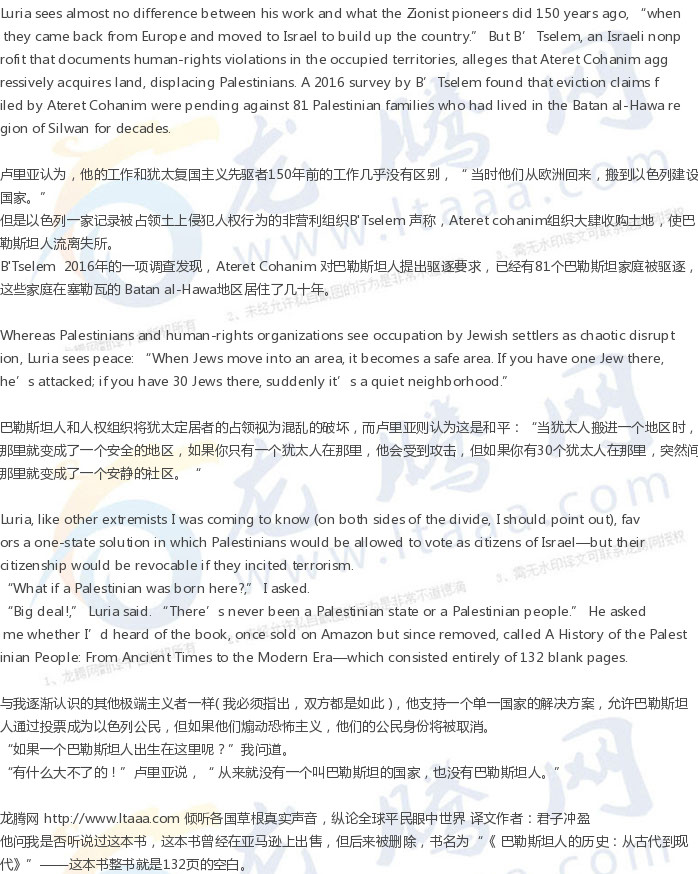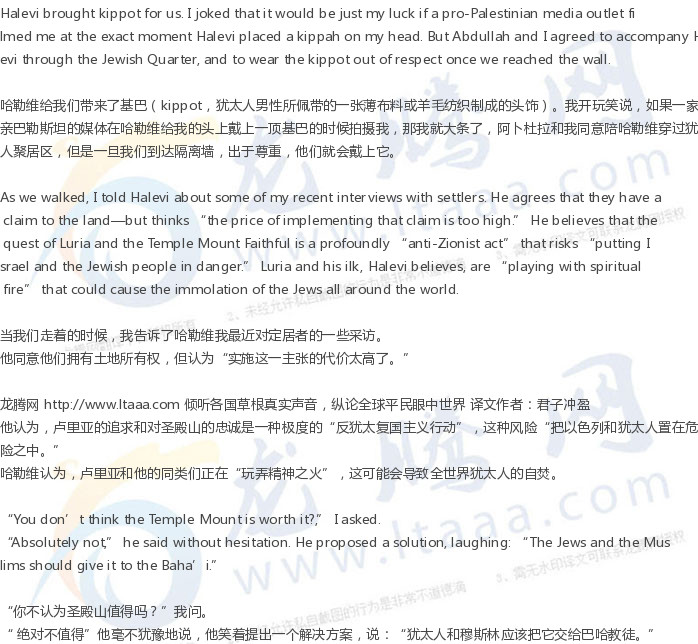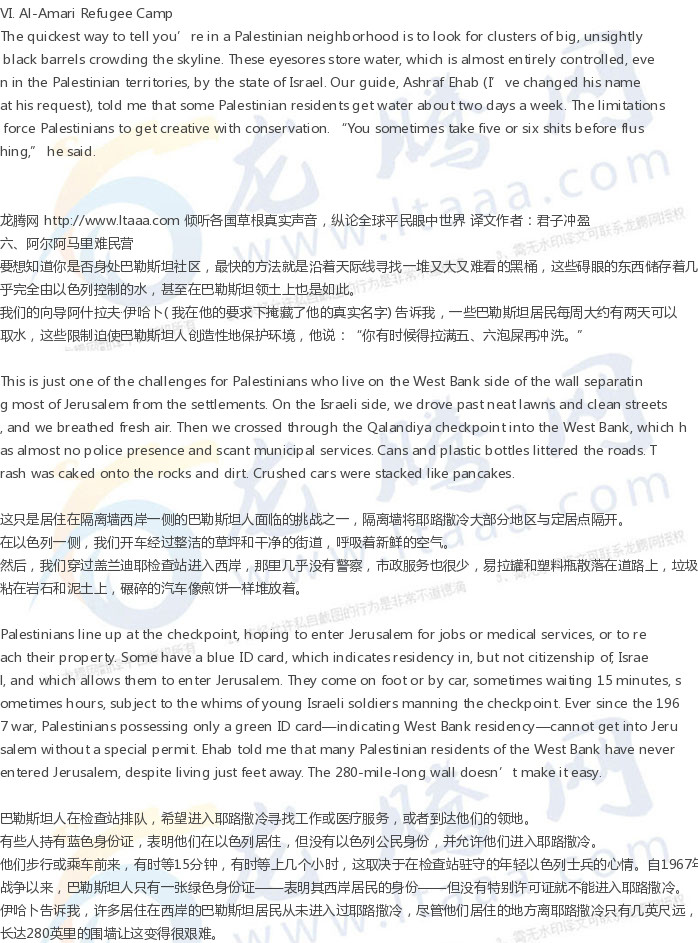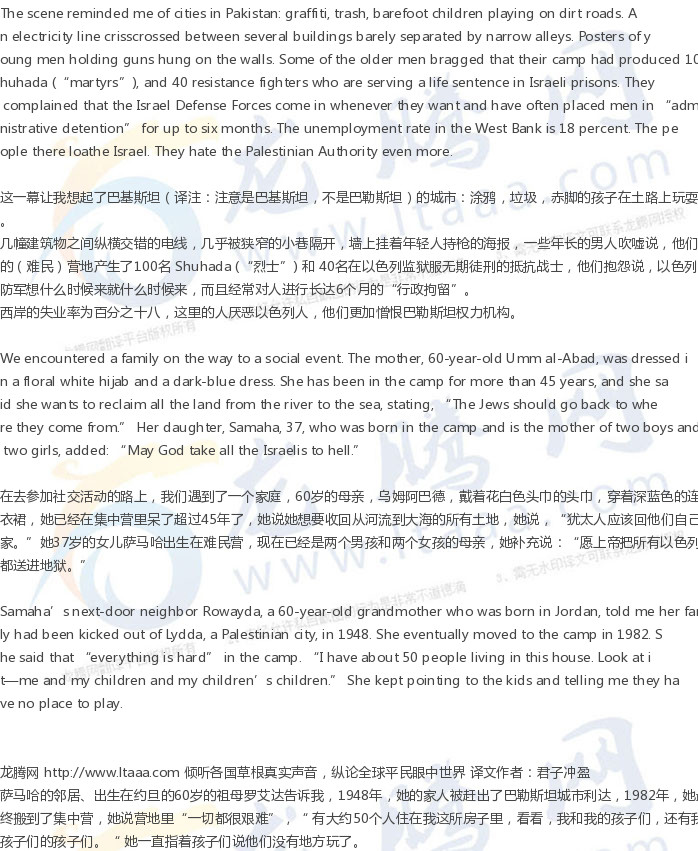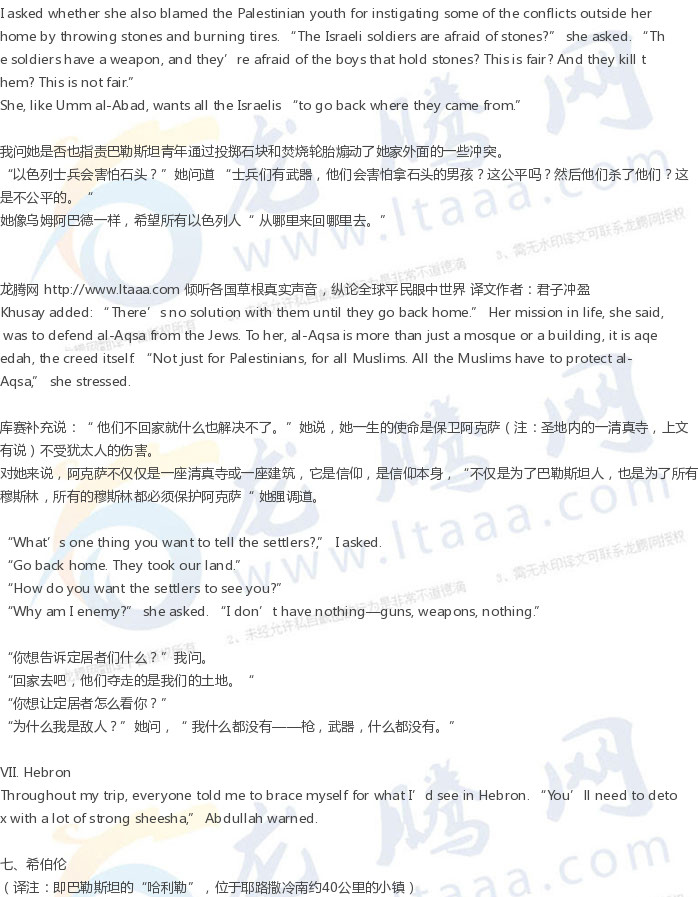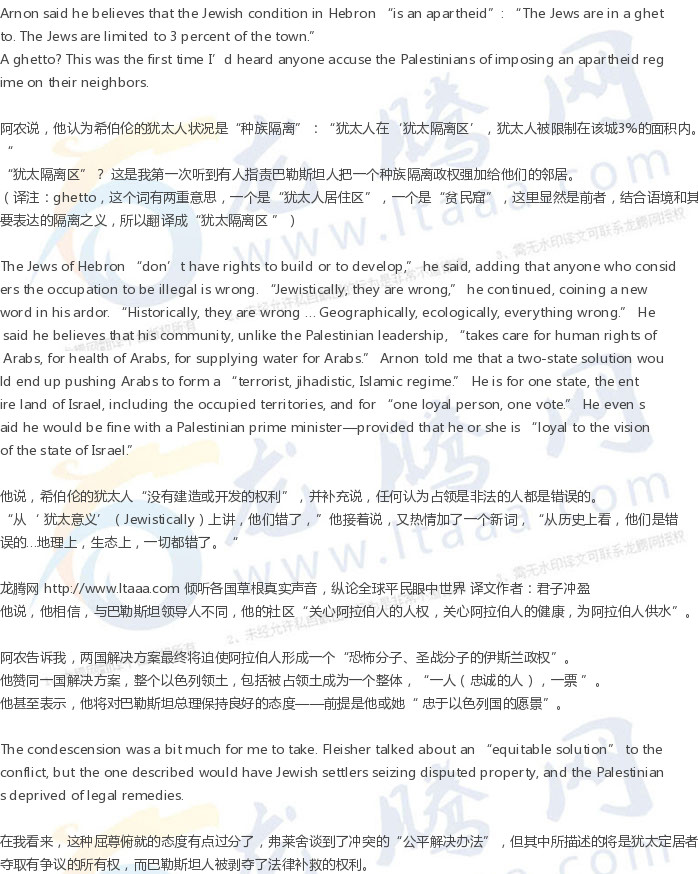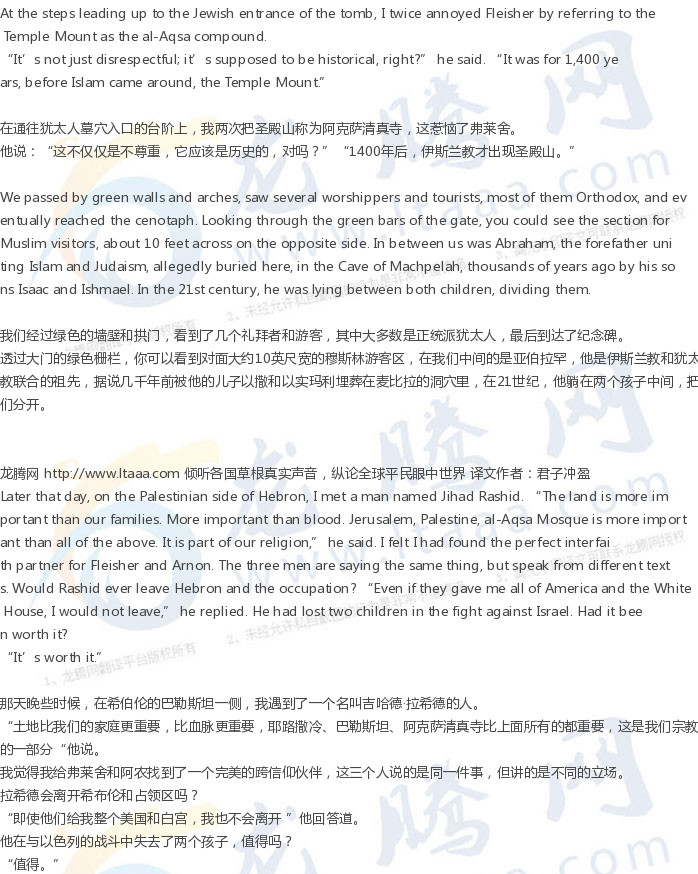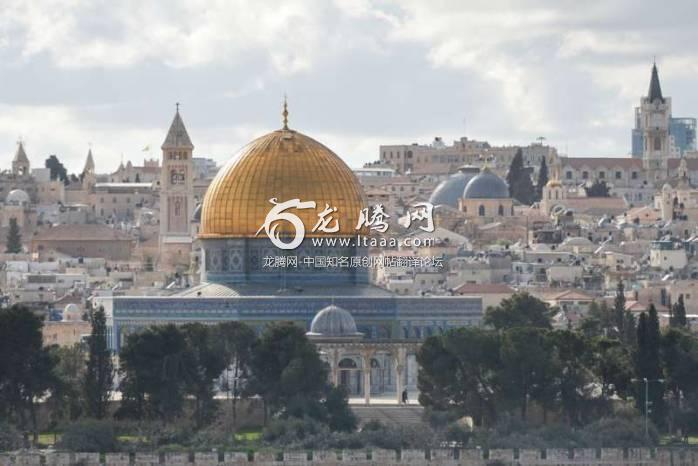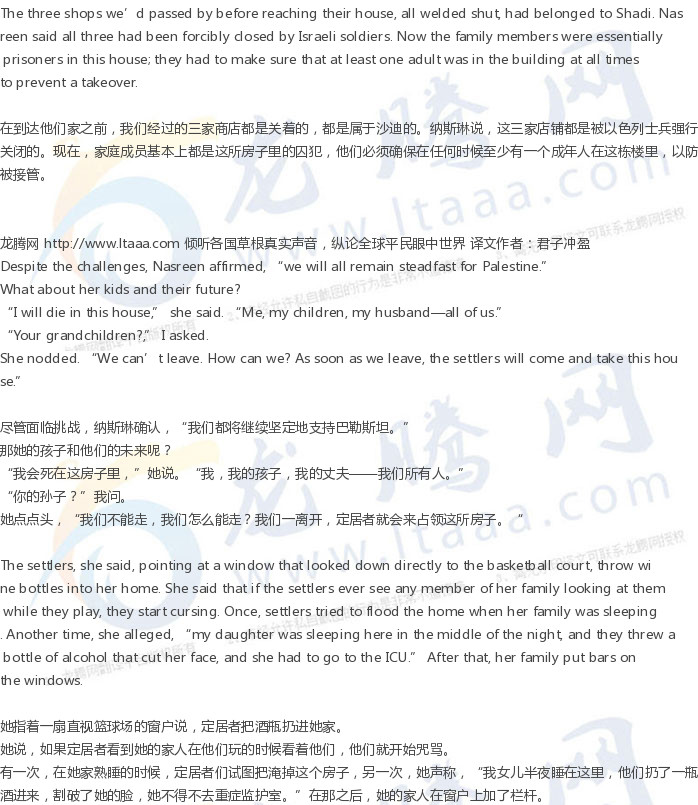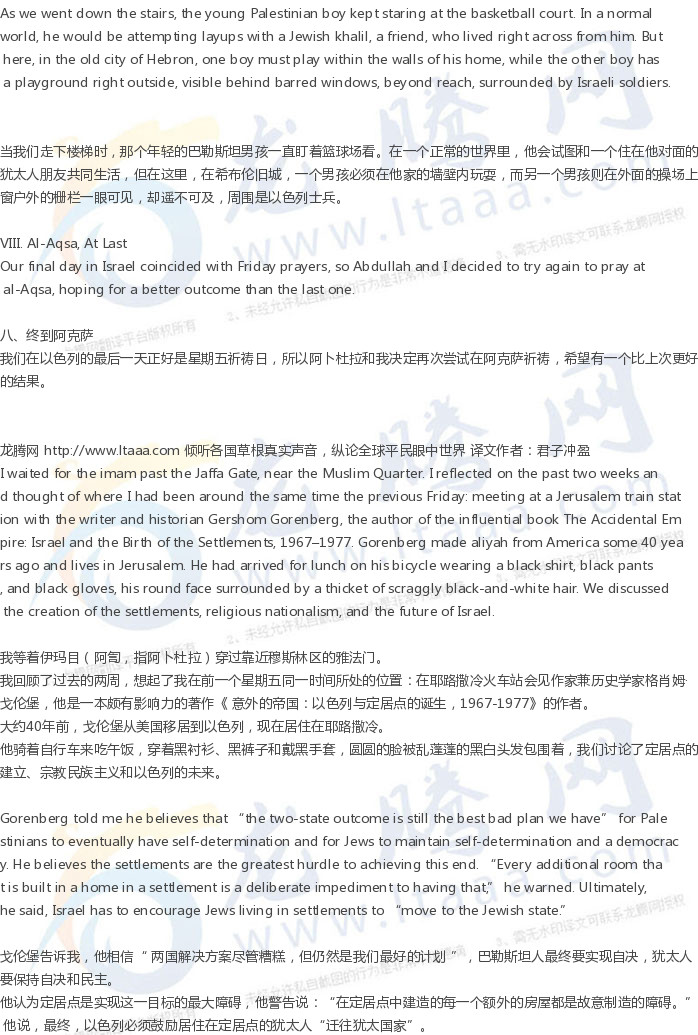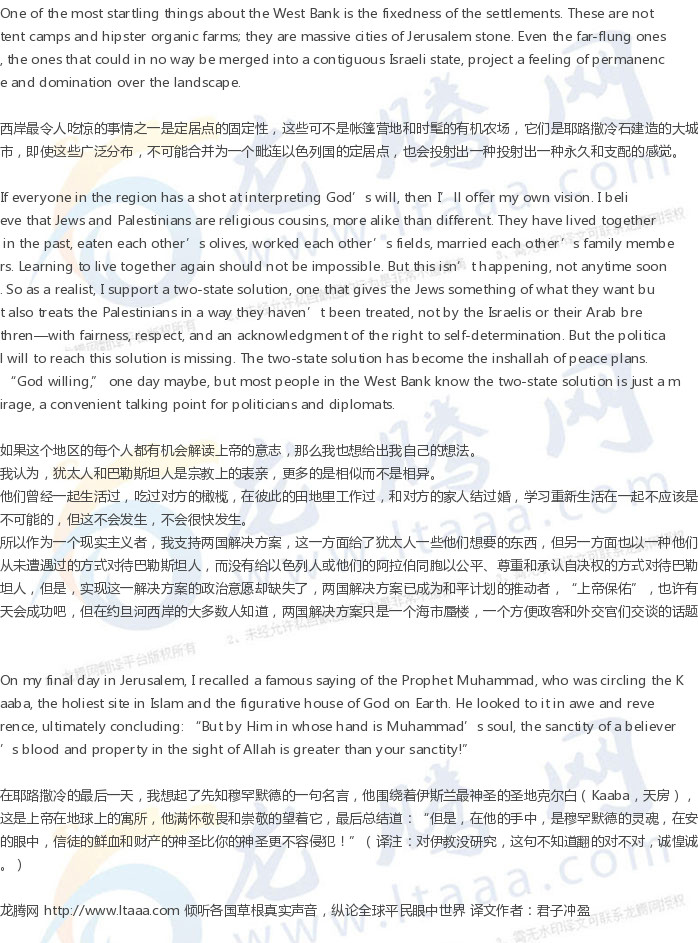跻身以色列定居者之间的穆斯林:当一位巴基斯坦裔美国作家深入约旦河西岸时会发生... [美国媒体]
我这里报道的是犹太定居者,即生活在1967年以前边界之外的60万以色列公民,我主要担心的是,通常谨慎的移民是否会敞开心扉,与我交谈:一个来自美国的棕色皮肤、虔诚的穆斯林。
A Muslim Among Israeli Settlers
What happens when a Pakistani American writer goes deep into the West Bank?
《 跻身以色列定居者之间的穆斯林:当一位巴基斯坦裔美国作家深入约旦河西岸时会发生什么?》
I was here to report on jewish settlers, the 600,000 citizens of Israel living beyond its pre-1967 borders. My main concern was whether the normally guarded and cautious settler community would open up and talk to me: a brown-skinned, practicing Muslim from the United States.
我这里报道的是犹太定居者,即生活在1967年以前边界之外的60万以色列公民,我主要担心的是,通常谨慎的移民是否会敞开心扉,与我交谈:一个来自美国的棕色皮肤、虔诚的穆斯林。
I. The Old City
Should I lie to an Israeli soldier in order to be allowed to pray? This was a theological dilemma I never studied in Sunday school, one I never thought I would have to confront.
Anxious and on edge, the soldier was standing in front of me, rifle in hand, blocking my way, and all I had to do was tell him I was 50 years old, and then I could pray at one of Islam’s holiest sites. One minor problem: I’m 37. Typically, when violence happens in the Old City of Jerusalem, Israeli authorities ban men younger than 50 from entering Haram al-Sharif, the compound known to Jews and Christians as the Temple Mount. And there had just been a small—by Middle Eastern standards anyway—spasm of violence. Three Palestinians had shot and killed two Israeli police officers near al-Aqsa Mosque inside Haram al-Sharif, which led to Israeli retaliations, which led to mass Palestinian protests, which led to yet another predictable round of stories datelined Jerusalem about the legendary Middle Eastern “cycle of violence.”
一、旧城
为了让我祈祷,我应该对一个以色列士兵撒谎吗?这是一个神学难题,我从来没有在主日学校学习,我从来没有想过我将不得不面对这种情况。
士兵站在焦急不安地我面前,手里拿着枪挡住了我的去路,而我所要做的就是告诉他我已经50岁了,然后我可以去伊斯兰教最神圣的地方之一祈祷。
一个小问题是:我实际37岁。通常情况下,当暴力事件在耶路撒冷旧城发生时,以色列当局禁止50岁以下的男子进入谢里夫圣地(译注:穆斯林对圣殿山的称呼,意为“高贵的避难所”),也就是是犹太人和基督教徒所熟知的“ 圣殿山”,而且,以中东的标准来看,刚刚发生了一场小规模的暴力冲突,三名巴勒斯坦人开枪打死了谢里夫圣地内阿克萨清真寺附近的两名以色列警察,这导致了以色列的报复,导致了大规模的巴勒斯坦抗议,导致了另一轮可预见的传说中的中东“暴力循环”的耶路撒冷故事。
When I had arrived at Ben Gurion Airport, outside Tel Aviv, a few days earlier, I had not anticipated this conundrum. This was not my first time in Israel. I’m a Pakistani-American Muslim, and I’ve been to Israel more times than half the Jews I know.
几天前,当我到达特拉维夫郊外的本古里安机场时,我没有预料到这个难题,这不是我第一次来以色列,我去以色列的次数比我认识的犹太人还多一半。
At the airport, I had been greeted by the giant, flawless face of the model Bar Refaeli, stretched across a billboard to sell me designer sunglasses. Tel Aviv is modern, its politics are progressive (at least by the dysfunctional standards of the Middle East), and much of the food there isn’t kosher. An hour later I was in Jerusalem, which might as well be on a different planet.
在机场,我看到了模特芭儿·拉法莉那张完美无瑕的巨大脸庞,她伸展开身段,站在广告牌上向我推销设计师设计的太阳镜,特拉维夫是现代的,它的政治是进步的( 至少以不正常的中东标准来说是这样 ),那里的很多食物都不符合犹太教规,一个小时后,我来到了耶路撒冷,去到那里还不如说去到另一个星球上。
“You. Fifty?” the young Israeli soldier asked me. He inspected my U.S. passport, hunting for my birth date. Muslim men who are 49 pose an existential threat to Israel; at 50, evidently, we turn into neutered kittens. Which means that all that stood between me and my chance to perform Friday prayers at al-Aqsa Mosque was a simple lie—as well as a squad of nervous soldiers carrying automatic rifles. I figured Allah would give me a celestial get-out-of-jail-free card for a white lie, but I haven’t aged horribly and can’t pass for 50.
“ 你,50?”年轻的以色列士兵问我,他检查了我的美国护照,寻找我的出生日期。
49岁的穆斯林男子对以色列的生存构成了威胁,50岁的时候,我们显然变成了绝育的小猫。
这意味着,我和我在阿克萨清真寺进行星期五祈祷的机会之间的一切只是一个简单的谎言——以及一队携带自动步枪的紧张士兵。
我以为真主会给我一张天赐的免牢狱卡,因为我撒了一个善意的谎,但我并没有老得可怕,也不能算得上50岁。
“Fifty? Fifty?” the soldier asked again, as I was pushed in the back by the bottleneck of Muslims trying to squeeze into a narrow gap.
Next to me, Abdullah Antepli, my guide and traveling companion, pleaded with another soldier. He proffered his passport, mixing his Turkish-accented English with bits of Arabic and Hebrew. Abdullah, who is usually jovial, reddened as his frustration grew.
“50?你50岁?“ 当我被穆斯林挤进一个狭窄的缺口并推到我的后背时,士兵又问了一遍。
在我旁边的是我的向导兼旅伴阿卜杜拉·安特普里,他在恳求另一名士兵。
他递上护照,带有土耳其口音的英语与阿拉伯语和希伯来语混合在一起,阿卜杜拉,平日天性快活,随着他的挫折感的加深,他脸红了。
The irony was thick. Abdullah, an imam and the director of Muslim affairs at Duke University, as well as a teacher in the divinity school there, was in Jerusalem to head a delegation from the Muslim Leadership Initiative, which he created with the Shalom Hartman Institute. The initiative brings American Muslims to the proudly Zionist Hartman Institute, headquartered in Jerusalem, for an intensive course about Judaism—and about how Jews understand the meaning of Zionism.
阿卜杜拉,杜克大学一个穆斯林事务主任,也是那里神学院的一名教师,他在耶路撒冷率领一个由他与沙洛姆·哈特曼研究所共同创建的穆斯林领袖倡议代表团。
这一倡议将美国穆斯林带到总部设在耶路撒冷的以犹太复国主义为傲的哈特曼研究所,开设一门关于犹太教以及犹太人如何理解犹太复国主义含义的强化课程——讽刺意味太浓了。
“He’s 50. Him. Not me,” I lied to the officer while pointing to Abdullah, who on a good day looks every one of his 44 years; that day, fortuitously, was not a good day.
“Okay, you come,” the young officer said to Abdullah, allowing the exasperated imam inside the compound. “You stay,” he said to me officiously.
With my small lie, Abdullah, ostensibly a security threat, walked in at the nearest entry point—a darkly comic episode in a surreal landscape, where everyone is perpetually nervous and obsessed with security.
“ 他50岁,他,不是我 ”我一边对警官撒谎,一边指着阿卜杜拉,在一个美好的日子里,他44年中的每一天都看上去很美,意外的是,这一天不是一个好日子。
“OK,你进来吧,”年轻的军官对阿卜杜拉说,让这位愤怒的阿訇进入了大院,“你留下”他淡淡地对我说。
带着我的小小谎言,阿卜杜拉,这个表面上的安全威胁,走到了最近的入口—— 一个超现实场景中的黑暗喜剧插曲,在那里每个人都永远紧张和痴迷于安全。
As an undergraduate at UC Berkeley, I was a member of the Muslim Student Association. I recall listening to more passionate khutbahs—Friday sermons—about the injustices in Palestine than stories about the Prophet Muhammad and his companions. The conflict in the Holy Land superseded all other Muslim suffering, including the ongoing occupation of Kashmir, the repression of Chechen Muslims, and the daily racism experienced by many African-American Muslims. I became a bit actor in a never-ending cosmic drama. I would parrot a script written by others, and serve as a proxy soldier for a tragedy happening across the Atlantic. The Jewish kids from the campus Hillel were my foil. We showed up to “debates,” predictable affairs where each side cheered and booed when appropriate but rarely engaged in a constructive dialogue.
作为加州大学伯克利分校的一名本科生,我是穆斯林学生协会的成员。
与先知穆罕默德和他的同伴们相比,我记得我听过更多关于巴勒斯坦不公正现象的充满激情的布道——星期五布道。
圣地的冲突取代了所有其他穆斯林的痛苦,包括对克什米尔的持续占领,对车臣穆斯林的镇压,以及许多非裔美国穆斯林每天经历的种族主义。
我在一部没完没了的宇宙戏剧里充当一个小演员,我愿意模仿别人写的剧本,充当大西洋彼岸发生的悲剧的代理士兵,学校里的犹太孩子是我的陪衬。我们出现在“辩论”中,这是可以预见的事情,双方都在适当的时候发出欢呼和嘘声,很少进行有建设性的对话。
We marched, chanted, rallied. We wore zionism is racism T-shirts. We thought we were differentiating Judaism from Zionism, the political ideology espoused by Theodor Herzl at the turn of the 20th century, which argued for the creation of a Jewish state in the Jews’ ancestral homeland of Israel. But too few of us Muslims bothered to ask how the many American Jews who consider themselves in some way Zionist felt upon hearing that Zionism was racism.
我们游行,吟唱,集会,我们穿的是印着“ 犹太复国主义是种族主义”字样的T恤,我们认为我们是在区分犹太教和犹太复国主义,犹太复国主义是西奥多 · 赫兹尔在20世纪初主张的政治思想,主张在犹太人祖先的家园以色列建立一个犹太国家。
但是,我们这些穆斯林中很少有人费心去问那些以某种方式认定自己是犹太复国主义者的美国犹太人,当他们听到“ 犹太复国主义是种族主义”的时候,他们是怎么想的。
The Muslim Leadership Initiative didn’t turn me into a Zionist “interfaith Trojan horse”—as I’ve been described by a few Muslim and Arab American activists. Quite the opposite—my experience in Israel underscored for me the urgency of working out how Palestinians could emerge from under the often-brutal Israeli occupation. I also remain committed to keeping this conflict from continually leaching into America, poisoning the relations between the religions and inspiring the worst, drunk angels of Jewish and Muslim communities to rise and fight in a Pyrrhic battle.
穆斯林领袖倡议并没有把我变成犹太复国主义者的“ 跨信仰特洛伊木马”——正如一些穆斯林和阿拉伯裔美国活动家所描述的那样。
恰恰相反,我在以色列的经历让我明白,迫切需要解决的问题是巴勒斯坦人如何摆脱以色列的野蛮占领。
我也仍然致力于防止这场冲突继续蔓延到美国,毒害宗教之间的关系,激励最坏的、喝得醉醺醺的犹太人和穆穆斯林社团在一场得不偿失的战斗中激斗。
But what my first trip with the initiative did for me was this: It turned the Jews into complicated humans. It exposed me to their narratives. On my first trip, I was overwhelmed by the reality that this mess seemed unfixable. But I was also overwhelmed by what I discovered was a gap in my knowledge. I was surrounded, at the Hartman Institute and on my forays into places such as Tel Aviv, by liberal Israelis who supported a two-state solution. Some of them didn’t know very much about Islam, but in the sheltering confines of the institute, there was not only respect for my Muslim faith, but also an acknowledgment that another people have a reasonable claim to the land that Israeli Jews call their own.
但我的第一次行动对我来说是这样的:它把犹太人变成了复杂的人类,让我了解到了他们的叙述。
在我的第一次旅程中,我被这样一个现实所压倒,那就是这个烂摊子似乎是无法解决的,但我也发现自己被知识的巨大鸿沟所压倒。
我在哈特曼研究所和前往特拉维夫等地时,被支持两国解决方案的自由派以色列人包围,他们中的一些人不太了解伊斯兰教,但在研究所的庇护范围内,不仅尊重我的穆斯林信仰,而且承认另一个民族对这片以色列犹太人称之为自己的土地的地方拥有合理的主权主张。
This was a fraught project. I didn’t have the impression that the settlers would have much patience for a brown-skinned Muslim critical of the occupation.
I asked my friends at the Hartman Institute where I should go first. They suggested that I ease in gently. And so my first stop was Efrat, the Scarsdale of the settlements.
这是一个令人忧心忡忡的项目,我没有定居者会对一个批评占领的棕色皮肤的穆斯林保持很大的耐心那样的幻想。我问我在哈特曼研究所的朋友,我应该先去哪里,他们建议我慢慢地深入,因此,我的第一站是埃弗拉特,斯卡斯代尔定居点。
II. Efrat
Haim Cohen, my Israeli driver, took me up into the hills south of Jerusalem, past security checkpoints, toward the settlement of Efrat, in the West Bank, near Bethlehem. Established in 1983, Efrat is an affluent community of 10,000 residents, built on the high ground of seven hills in the Judaean Mountains. It’s one of the gentrified jewels of Gush Etzion, a collection of more than a dozen settlements housing more than 80,000 people. Efrat is one of those settlements that many believe would become part of Israel in a land swap with Palestine. Not that such a deal is on the horizon.
二、埃夫拉特
(注:以色列地名,位于耶路撒冷以南)
我的以色列司机哈伊姆·科恩带我上了耶路撒冷南部的山丘,经过安全检查站,前往伯利恒附近,西岸的埃夫拉特定居点。埃夫拉特建于1983年,是一个拥有1万名居民的富裕社区,建在犹太山脉七座小山的高地上。
这是古什埃齐翁上流社会云集的明珠之一,古什埃齐翁是十几个定居点的集合体,居住着8万多人,埃弗拉特是其中一个定居点,许多人认为,通过与巴勒斯坦的土地交换,它将成为以色列的一部分,但并不是说这样的交易即将出现。
Stunning vineyards, beautiful maple and pine trees, and flourishing gardens filled the landscape. The roads were spotless; the roundabouts had striking green grass, perfectly cut; and all around us we saw idyllic, sand-colored homes made of Jerusalem stone and red tiles.
令人叹为观止的葡萄园,美丽的枫树和松树,以及繁茂的花园,充满了美丽景观,道路一尘不染,环形路上绿草如茵,完美切隔成片,我们周围的都是用耶路撒冷的石头和红瓦建造的田园般的、沙色的房屋。
In the administrative building, I waited for a meeting with Oded Revivi, the popular mayor of Efrat, currently serving his second term. A bulletin board advertised houses for sale. I did the conversion in my head: Each unit was selling for $1 million.
在行政大楼里,我等待着与奥德·雷维维的会面,他是一位颇受欢迎的埃夫拉特市长,目前正在担任第二个任期,公告牌上登着出售房屋的广告,我在脑海中快速进行了转换:每套售价约为100万美元。
I walked outside and was greeted by a firm handshake and an American accent. Bob Lang, the 59-year-old head of Efrat’s religious council, offered to give me a quick tour of the settlement. The son of German immigrants to the United States, Lang moved to Israel for religious and ideological reasons, because according to him, this is “where Jewish history happened.” These are the valleys, he said, where his forefathers—Abraham, Isaac, and Jacob—walked. I wondered whether Abraham, a shepherd, would have been able to get a mortgage in Efrat.
我走到外面,迎接我的是坚定的握手和美国口音。
鲍勃朗,59岁的埃夫拉特宗教委员会主席,提出让我快速参观定居点,作为移民到美国的德国人之子,鲍勃朗出于宗教和意识形态的原因搬到了以色列,因为在他看来,这是“犹太历史发生的地方”。
他说,这就是他的祖先亚伯拉罕、以撒和雅各所走过的山谷——我想知道亚伯拉罕,一个牧羊人,是否能够在埃夫拉特获得抵押贷款。
Lang told me it “annoys him” when people say the settlers illegally occupy the land. Depending on your perspective, he said, the land was taken, captured, or liberated by Israel during the Six-Day War, in 1967.
Which term do you prefer?, I asked.
“Liberated,” he replied.
鲍勃朗告诉我,当人们说定居者非法占领这块土地时,这让他“很恼火”,他说,根据你的看法,这片土地是在1967年的六日战争中被以色列占领、夺取或解放的。
“你更喜欢哪种说法?”我问他。
“解放”,他回答道。
“Sometimes, I think my Jewish neighbors don’t hear” the adhan, he said. “It’s the way their mind is structured.” Schlesinger’s mind had once been structured the same way. To him, the Palestinians had been “background noise—the gray, drab scenery that passes in the distance in a movie.”
“有时,我认为我的犹太邻居没有听到”,他说“ 这是他们的思维定式 ”施莱辛格的头脑曾经有过同样的思维定式,对他来说,巴勒斯坦人已经是“背景噪音——如同电影中远处灰色,单调的风景。”
About four years ago, Schlesinger attended an interfaith meeting where he met Yasin, a 17-year-old Palestinian who was wearing a seeds of peace T-shirt he had received at a camp in Maine. Schlesinger was baffled that a Palestinian could promote peace; the concept was an oxymoron to him. Schlesinger then met Jamaal, the boy’s father, and learned that the family was from the Palestinian town Beit Ummar. Jamaal told him that when the Palestinian children in his town saw a Jewish settler like Schlesinger, they ran and cried.
大约四年前,施莱辛格参加了一次不同信仰间的会议,在会上他遇到了17岁的巴勒斯坦人亚辛,他穿着一件在缅因州一个营地收到的“和平种子 ”T恤。
施莱辛格对巴勒斯坦人能够促进和平感到困惑;这个概念对他来说是矛盾的。
随后,施莱辛格会见了男孩的父亲贾马尔,得知这家人来自巴勒斯坦城镇拜特吾马,贾马尔告诉他,当他镇里的巴勒斯坦儿童看到施莱辛格这样的犹太定居者时,他们都跑了,大哭了起来。
“Why?,” Schlesinger asked.
“They all carry submachine guns, and they kill our kids,” Jamaal replied.
A lot of his friends did carry Uzis or pistols, Schlesinger conceded.
“为什么?”施莱辛格问道。
“他们(以色列人)都携带着冲锋枪,他们杀害了我们的孩子。”贾马尔回答。
施莱辛格承认,他的很多朋友都带着乌兹冲锋枪或手枪。
Rabbi Hanan Schlesinger, the author’s guide in the Alon Shvut settlement, poses outside his home, January 17, 2018.
图:2018年1月17日,拉比·哈南·施莱辛格,作者在阿隆施瓦特定居点的向导,在他家外面摆姿势拍照
He considered this exchange to be a “blessing,” because it was the first time in his life that he had experienced how “the other” experienced him—as an occupier.
The revelation was like a “dagger to my heart,” Schlesinger told me. He’d never thought of what the settlers were doing as an occupation: “Living around here, I see the return of the Jewish people to our land after 2,000 years of exile. I see triumph. I see righteousness … And suddenly, I hear that our triumph is another nation’s tragedy, and our righteousness is another nation’s suffering. I didn’t know where to put that.”
他认为这种交流是一种“赐福”,因为这是他有生以来第一次体验到“对方”对他的体验——作为一个占领者,施莱辛格告诉我,这个启示就像一把“插在我心里的匕首”。
他从来没有想过定居者所做的是一种占领:“ 住在这里附近,我看到犹太人在流亡两千年后回到我们的土地上,我看到胜利了,我看到正义。。但突然间,我听说我们的胜利是另一个国家的悲剧,我们的正义是另一个国家的苦难,我不知道该如何自处。“
“I’m the luckiest person on Earth,” Cohen told me as we stood on his back porch overlooking his utopia. Cohen’s kids, barefoot, were running around.
“我是地球上最幸运的人,”科恩对我说,当时我们站在他的后门廊上,俯瞰着他的乌托邦,科恩的孩子们光着脚到处跑。
Noam Cohen, a settler in Neve Erez, an outpost in the West Bank, January 17, 2018. Cohen believes that someday all of humanity will be one. But in the meantime, he believes that the Palestinians must be forcibly transferred to Jordan. (Tanya Habjouqa)
图:诺姆·科恩,奈夫埃雷兹(西岸的一个前哨)定居者,2018年1月17日。科恩相信,终有一天人类会成为一体。但与此同时,他认为巴勒斯坦人必须被强制转移到约旦。
Cohen said that his community is considered an illegal outpost, but that the Israeli government helps it out: “They give us money to build everything—all the lights around, all the roads in here.” The government also provides water, picks up the garbage, and sends a school bus for his kids.
“We got everything, but not officially,” he added.
科恩说,他的社区被认为是一个非法的前哨,但以色列政府帮助了它:“他们给我们钱建设一切——周围所有的灯,所有的道路。”政府还提供水,清理垃圾,还给他的孩子们送一辆校车。
“我们得到了一切,但不是正式的 ”他补充说。
V. The Old City, Part II
“I actually don’t mind the word conquered,” Daniel Luria told me in his Australian accent, referring to Israel’s acquisition of Palestinian land after the 1967 war. We were walking outside the Old City walls on a cool Jerusalem night. A few hundred Israelis, flanked by soldiers and police vehicles, were gathering for an annual march organized by the Women in Green, a group dedicated to the preservation of what it believes to be the Jews’ God-given biblical homeland.
五、旧城 II
“我其实并不介意‘征服’这个词”丹尼尔· 卢里亚用他的澳大利亚口音告诉我,他指的是1967年战争后以色列对巴勒斯坦土地的占领。
在一个凉爽的耶路撒冷夜晚,我们在旧城城墙外散步,数百名以色列人聚集在士兵和警车的侧翼,参加由“绿色女性”(Women in Green)组织的年度游行,该组织致力于保护它认为是犹太人上帝赐予的圣经家园。
(译注:Women in Green 是一个以色列非营利组织, 1993 年成立,主旨是"在对以色列土地的热爱、奉献和忠诚中统一起来")
Luria was raised in a religious Zionist home in Australia. He tried at age 11 to emigrate by himself, intending to get from Melbourne to Israel. (He was stopped a few miles from home, carrying underwear, an atlas, and a Bible.) Years later, at age 30, he finally found his way to Jerusalem, and he now lives in Ma’ale Adumim, one of the West Bank’s largest settlements, with his wife and five kids. Many Israelis believe that Ma’ale Adumim, which sits east of Jerusalem, would have to be part of Israel in any peace deal. Palestinians see what that would do to the West Bank—effectively cut it in half.
卢里亚是在澳大利亚犹太复国主义者的家中长大的,他在11岁时试图自己移民,打算从墨尔本移居到以色列。(他带着内衣、地图册和一本圣经出走,在离家几英里的地方被拦住。)
若干年后,30岁的他终于找到了去耶路撒冷的路,现在他与妻子和五个孩子住在西岸最大的定居点之一:马阿勒阿杜明。
许多以色列人认为,位于耶路撒冷以东的马阿勒阿杜明,在任何和平协议中都必须成为以色列的一部分。巴勒斯坦人看到了这会对约旦河西岸造成什么影响——实际上是将约旦河西岸土地削减了一半。
Tisha B’Av is a day of mourning, but for many Jews today, their return to the land from which the Romans exiled them makes the mourning substantially less bitter. “I’m not in exile, anymore … I’ve got my country,” Luria said.
Isn’t that enough?, I asked him.
No, he said.
For Luria and his fellow marchers that day, redemption will not be complete until they achieve the missing piece that will make the fragmented dream whole: the Temple Mount.
“ 圣殿被毁日”是一个哀悼日,但对今天的许多犹太人来说,他们回到罗马人放逐他们之前的土地,使哀悼的痛苦大大减轻,“我不再流亡了。。我有我的国家“卢里亚说。
“这还不够吗?”我问他。
“不够 ”,他说。
那天,对于卢里亚和他的同伴们来说,救赎是不会完成的,除非他们得到那块缺失的部分,它将使支离破碎的梦想完整:圣殿山。
Luria is a spokesman for Ateret Cohanim, a group founded in 1978 and dedicated to, as he puts it, “the revival of Jewish life.” The organization helps settle Jews in the Muslim Quarter of the Old City and in neighborhoods of East Jerusalem. Some 3,000 Jews now live, protected by armed Israelis, in the densely populated Muslim Palestinian areas of the Old City and Silwan.
卢里亚是 Ateret Cohanim 的发言人,Ateret Cohanim 成立于1978年,用他的话说,致力于“犹太生活的复兴”,该组织帮助犹太人定居在旧城的穆斯林区和东耶路撒冷的社区,目前约有3000名犹太人生活在旧城和塞勒瓦(耶路撒冷塞勒瓦地区)人口稠密的巴勒斯坦穆斯林地区,他们受到以色列武装人员的保护。
Luria doesn’t consider Jews who want to liberate the Temple Mount to be on the same level as Muslim terrorists, “depraved animals” who stab people.
I told Luria that he sounded like a fundamentalist.
“I believe in the fundamentals of Judaism,” he replied. “Nothing wrong with that,” as long as it doesn’t lead to violence like the stabbings and beheadings committed by some Muslims.
卢里亚不认为想要解放圣殿山的犹太人与穆斯林恐怖分子、刺伤人的“堕落的动物”处于同一水平。
我告诉卢里亚他听起来像个原教旨主义者。
“我相信犹太教的基本教义,”他回答,“这没什么错 。”只要它不导致暴力,如一些穆斯林的刺杀和斩首。
“Have you ever had moments of doubt—where you felt, ‘Maybe I’m not doing it right, maybe I’m not fulfilling God’s—’?”
“Never, not once,” he said, cutting me off.
“In your entire life?”
“Never.”
“你是否曾有过怀疑的时候——当你感到‘也许我做得不对,也许我没有奉行上帝的旨意’?”
“从来没有,一次也没有”他说,打断了我的话。
“ 终你一生?”
“从来没有。”
Yossi klein halevi says he fears Jews like Daniel Luria. He believes that they have a “spiritual madness,” and that their longing for the Temple Mount reveals a “fundamental lack of responsibility.”
At sunset, Halevi invited Abdullah and me to accompany him to the Western Wall, where he would be offering prayers.
尤西·克莱因·哈勒维说他害怕像丹尼尔·卢里亚这样的犹太人。
他认为,他们有一种“精神疯狂”,他们对圣殿山的渴望揭示了“根本上的责任缺失”。
日落时,哈勒维邀请阿卜杜拉和我陪他去西墙(注:也就是哭墙),他将在那里祈祷。
(译注:巴哈教(Bahā’ī),或称“巴哈伊教”“大同教 ”,是当代新兴的一个世界性宗教,巴哈教由伊斯兰教脱胎而出,是什叶派的十二伊玛目支派一个 “异端” 派,相信一个无形无相的上帝, 耶稣基督, 佛陀, 穆罕默德, 以及历代的圣贤均为上帝派下来的先知,其宗旨是:“独立寻求真理,不为迷信或传统所限:人类一家,是关键的原则和基本的信条;所有宗教的基本合一;谴责任何形式的偏见,无论是宗教、种族、阶级或民族的;宗教与科学比有和谐;男女平等,是使人类能够跃翔的两翼;普及义务教育;创造普及世界统一的语言;消灭极端的贫困和富有;成立世界最高法庭,解决国家之间的纠纷;乐于劳动,参与属灵侍奉;正义是人类社会和宗教的最高原则;以建立持久普遍的和平为全人类的最高目标。”——谣传潘石屹、方大同信仰这个教,不知真假。)
Descending to the wall, we put on our kippot along with hundreds of Jewish men, some praying out loud, others seated in small prayer circles, a few swaying back and forth, not quite lamenting or weeping, but all gathered with a dedicated solemnity. I’ve visited the wall three times, and each time I’ve approached it with respect and reverence, as a visitor who would expect the same from his Jewish brothers and sisters at a Muslim holy site.
我们下行到墙边,和数以百计的犹太男子一起戴上了基巴,有的大声祈祷,有的坐在小祈祷圈里,有几个来回摇摆,不是悲叹,也没有哭泣,但所有人都怀着一种庄严肃穆的心情聚集在一起。
这堵墙我参观了三次,每次我都怀着尊敬和崇敬的心情走近它,作为一个游客,我希望他们的犹太兄弟姐妹在穆斯林圣地也能看到同样的期待。
I see how the wall, with prayers embedded in the narrow spaces between its bricks, inspires an expansion of hearts, bringing joy and love to the faces of believers. The same wall ironically constricts: Men and women must be separated when they pray. Jewish women have returned to the Western Wall after thousands of years, only to be denied equal rights.
我看到了这堵墙,其中的祈祷是如何嵌在其砖之间狭窄的空间内,激发了心灵的扩散,给信徒们的脸上带来了欢乐和爱,讽刺的是,同样的墙也在收缩:男人和女人在祈祷的时候必须分开,数千年后,犹太妇女重返哭墙,却被剥夺了平等的权利。
Known as “the separation barrier,” the wall, which is more than 25 feet tall in sections, stretches from Jenin in the north to Hebron in the south, dividing Israelis from Palestinians. It has also separated thousands of Palestinians who once lived in the same city. This creates absurdities: The Palestinian neighborhood of Kafr Aqab is part of East Jerusalem—but since the building of the wall, it is now physically separated from the city, so many of its residents have to travel daily through the Qalandiya checkpoint, blue ID in hand, just to reach work, attend school, or meet other family members in Jerusalem.
这堵墙被称为“隔离墙”,部分高度超过25英尺,从北部的杰宁延伸到南部的希伯伦,将以色列人和巴勒斯坦人隔开,它还将曾经生活在同一城市的数千名巴勒斯坦人分隔开来。
这就产生了一些荒谬的现象:Kafr Aqab 的巴勒斯坦社区是东耶路撒冷的一部分——但自从修建隔离墙以来,它现在与该城实际上是分开的,因此它的许多居民不得不每天通过盖兰迪耶检查站进出,手里拿着蓝色身份证,只是为了去工作、上学或在耶路撒冷见其他家庭成员。
Israel justifies the wall as a necessary security measure, citing the dozens of suicide attacks that took place inside Israel from late 2000 to early 2004 during the second intifada, in which more than 900 Israelis, soldiers and civilians, died. Ehab told me the wall is a “thriving business for the Palestinian mafia.” He took me to a section where people were using a makeshift ladder to cross over illegally into Jerusalem for work and criminal activities. “What security?” he asked.
以色列称隔离墙是一项必要的安全措施,并列举了2000年底至2004年初“二次起义” (阿克萨群众起义)期间在以色列境内发生的数十起自杀式袭击,在这次袭击中,900多名以色列人、士兵和平民丧生。
伊哈卜告诉我,隔离墙是“巴勒斯坦黑手党一门兴旺的生意 ”,他带我去了一个地方,那里的人们用临时的梯子非法越境进入耶路撒冷工作和从事犯罪活动。“哪有安全?”他问。
Ehab wanted to stop near Ramallah, at the al-Amari refugee camp, which was established in 1949 and serves as a home to more than 6,000 Palestinian refugees, many of whom are still holding on to the hope for a “right of return.” They want to go back to villages that no longer exist. Al-Amari is one of 19 refugee camps in the West Bank. Several generations of Palestinians have been born and raised in these camps.
伊哈卜想在拉姆安拉(巴勒斯坦地区城市)附近停下来,最后停在了阿尔阿马里难民营,该难民营建于1949年,是6000多名巴勒斯坦难民的家园,其中许多人仍然抱着“重返家园”的希望。
他们想回到已经不存在的村庄里去,阿尔阿马里是西岸19个难民营之一,几代巴勒斯坦人在这些难民营中出生和长大。
Although Rowayda realizes it’s unlikely that she will return to her original land, she still holds out hope. She said her grandfather had owned farms in Lydda and cultivated crops there, but “they”—the Jews—“took our homes, took our land.” She said she’ll “never be able to forgive the settlers,” even if they gave all the land back, because of all the suffering she’s experienced in her life. She said she wants to “eat them all alive.”
虽然罗艾达意识到她不太可能回到原来的地方,但她仍然抱有希望。
她说,她的祖父在吕大(以色列城市名)拥有农场,并在那里种植作物,但“他们”——犹太人——“夺走了我们的家园,夺走了我们的土地。”
她说她“永远都不能原谅那些定居者”,即使他们归还了所有的土地,因为她在生活中经历了所有的痛苦,她说她想“活吃了他们”。
You hear this anger again and again from many Palestinians in the West Bank. In the global conversation about the occupation, people assume that Palestinians, when or if they are freed to have a country of their own in the West Bank, will be satisfied with their lot. But many Palestinians I encountered think of the people in Tel Aviv as settlers as well. In al-Bireh, a Palestinian city north of Jerusalem, I met a woman named Umm Khusay, who had turned the front lawn of her house into a museum of the occupation, featuring a palm tree decorated with tear-gas canisters.
我们一次又一次地听到西岸许多巴勒斯坦人的愤怒,在关于占领的全球对话中,人们假定巴勒斯坦人在被解放后,或如果在西岸拥有自己的国家后,他们会对自己的命运感到满意,但我遇到的许多巴勒斯坦人认为特拉维夫的人也是定居者,在耶路撒冷以北的巴勒斯坦城市 al-Bireh,我遇到了一位名叫乌姆库赛的妇女,她把她家的前草坪变成了一座占领博物馆,里面有一棵用催泪弹罐装饰的棕榈树。
As we walked up the steps to the front door, I could see a giant hole in one of the windows, recently broken by what seemed to be a stone. Khusay, a 48-year-old Muslim who was born in Michigan—she is an American citizen—but raised in al-Bireh, met us at the top of the stairs wearing a beige jilbab covering her from head to toe. All of her children are American citizens now.
当我们走上前门的台阶时,我看到其中一扇窗户上有一个大洞,最近被一块似乎是石头的东西打破了。
48岁的乌姆库赛是一位出生在密歇根州的穆斯林,她是一名美国公民,但在al-bireh长大,我们在楼梯顶上看到她时,她从头到脚罩着一件米黄色的穆斯林外套(Jilbab),她所有的孩子现在都是美国公民。
“I die here rather than have happy life in the United States,” she said when I asked her why she didn’t join her family in the U.S. “I love my land. I have many problems, but I can’t leave.”
Khusay said she feels anger when she sees the settlers of Psagot, just up the road from al-Bireh. “This is Palestinian land. Why did they take this land? Why?”
She paused and looked at me: “Would you like someone to take your home?”
“我宁愿死在这里,也不去美国过着幸福的生活,”当我问她为什么不加入她在美国的家庭时,她说“我爱我的这片土地,我有很多问题,但我不能离开。“
库赛说,当她看到Psagot(就在al-bireh的路上)的定居者时,她感到愤怒,“这是巴勒斯坦人的土地,他们为什么要夺走这片土地?为什么?“
她停顿了一下,看着我说:“你会喜欢有人夺走你的家吗?”
About 800 Jewish settlers live in this enclave, protected by 650 or so Israeli soldiers and surrounded by 200,000 Palestinians, who are penned in by dozens of roadblocks and checkpoints around the city. The dreams of those 800 or so Jewish settlers shape and distort the lives of all the Palestinians living there. Hebron had a Jewish community until 1929, when the Jews were killed in a riot. In 1968, settlers came back for good.
大约800名犹太定居者生活在这个飞地,约650名以色列士兵保护着他们,200000名巴勒斯坦人包围着他们,他们在城市周围设置了几十个路障和检查站,大约800名犹太定居者的梦想塑造和扭曲了生活在那里的所有巴勒斯坦人的生活。
希伯伦有一个犹太社区,直到1929年,犹太人在一次暴乱中被杀,1968年,定居者永久性地回来了。
We met one of these settlers, Noam Arnon, near the entrance to a playground. He shuffled toward us in his sandals, resembling a kindly Jewish American grandfather. In 1972, at 18, Arnon decided to visit the settlement of Kiryat Arba. He kept returning, eventually becoming involved in excavations and helping restore the old synagogue. Today he is not only a spokesman of the Jewish community of Hebron but also a historian and an expert on the Tomb of the Patriarchs.
我们在操场入口处附近遇到了其中一名定居者诺姆·阿农,他穿着凉鞋慢吞吞地向我们走来,就像一位慈祥的美国犹太祖父,1972年,18岁的阿农决定去基尔亚特阿尔巴定居点,他不断返回,最终参与挖掘工作,并帮助修复旧犹太教堂,今天,他不仅是希伯伦犹太社区的代言人,而且还是一位历史学家和“列祖之墓”(Tomb of the Patriarchs)方面的专家。
Yishai Fleisher, a radio host and frequent commentator for international media, was to lead our tour. Born in Israel, he earned a legal degree at Cardozo School of Law, in the U.S.
Fleisher leaped out of his car with a boyish energy, extending his hand and welcoming us with a giant grin. He was carrying a big, visible handgun. “There are only two kinds of minorities in the Middle East,” Fleisher told me. “Armed and unarmed.”
电台主持人、国际媒体的频繁评论员耶西·弗莱舍将负责我们的行程,他出生于以色列,在美国卡多佐法学院获得法律学位。
弗莱舍带着一种孩子气的神气从车里跳了出来,伸出一只手,笑容满面地欢迎我们,他带着一把又大又醒目的手枪。“中东只有两种少数民族,”弗莱舍告诉我,“武装和非武装。”
Arnon gave us a quick tour around the community before we headed over to the Tomb of the Patriarchs. He took us first into the playground and pointed at a mural depicting flames emerging from a baby carriage. It was to honor a 10-month-old baby who had been killed in 2001 by a sniper bullet that had come from “over there,” he said, motioning toward a nearby hill. I asked him whether it was worth staying in Hebron, especially with children, considering the danger. Yes, he said. “Children play here, and every one of them is a victory over terror.”
在我们前往“列祖之墓”之前,阿农带我们在社区里作了一次快速的参观。
他先把我们带到操场上,指着一幅壁画,画的是一辆婴儿车里冒出来的火焰,他说,这是为了纪念2001年被“那边”——他指着附近的一座小山——来的狙击手子弹打死的一名10个月大的婴儿。
我问他,考虑到这种危险,留在希布伦是否值得,特别是孩子们也在。是的,他说“孩子们在这里玩耍,他们每一个人都是战胜恐怖的胜利者。”
Doesn’t that sound a lot like colonialism?, I asked.
“What is it to do with colonialism?,” Fleisher said, offended. “We’re taking our property. It’s our land. We purchased it. We’re trying to move into here. How is that possibly colonialism?”
“ 这听起来是不是非常殖民主义?”我问道。
“ 这和殖民主义有什么关系?”弗莱舍生气地说,“ 我们要拿走我们的东西,这是我们的土地,我们买下了它,我们想搬到这里来,这怎么能是殖民主义?“
On our way to the Tomb of the Patriarchs, I asked Fleisher whether Arab citizens of Israel could be equal to Jews.
“No, not in my opinion,” he said.
He added that the word occupier is a “fantastic, audacious, bold move to delegitimize Jewish presence” in Hebron, which he credited to the forces of “narrative jihad.”
在前往“列祖之墓”的路上,我问弗莱舍,以色列的阿拉伯公民是否可以与犹太人平等。
“不,在我看来不是 ”他说。
他补充说,在希伯伦,使用“ 占领者”这个词是一个“古怪、鲁莽的,使犹太人存在非法化的举动”,他将其归咎于“叙事圣战”势力。
We left Rashid’s shop and entered a souk, venturing deeper into the old city of Hebron. Shop after shop was closed, the green metal doors shut. Above us was wire mesh in between long, lime-green metal bars that crisscrossed and formed a semiopen dome. I felt like we were birds in a cage. Ashraf Ehab told me that this “shield” had been installed years ago to protect Palestinians from the trash that Israeli settlers would throw down from the houses above.
我们离开拉希德的商店,进入一个露天市场,深入到希伯伦的旧城。一家又一家的商店关门了,绿色的金属门也关上了,在我们的上方是铁丝网,在长长的、石灰绿的金属栏杆之间,它们纵横交错,形成了一个半开放的穹顶,我觉得我们就像笼子里的鸟。
阿什拉夫·埃哈卜告诉我,这个“防护盾”是几年前安装的,目的是保护巴勒斯坦人不受以色列定居者从上面房屋扔下来的垃圾的伤害。
We walked toward a two-story building that was surrounded on three sides by the Jewish community of Hebron. At the top of a yellow metal staircase, by the front door, we met an overweight Palestinian kid in dark-blue sweats and a multicolored T-shirt who looked like I had when I was 10. He was leaning against a railing, looking down at a pristine basketball court used exclusively by Jewish settlers, constructed between his building and a Jewish neighbor’s house.
我们朝一座两层楼高的建筑走去,它三面被希伯伦的犹太人社区包围着。在前门,一个黄色金属楼梯的顶部,,我们遇到了一个胖胖的巴勒斯坦孩子,他穿着深蓝色的汗衫和一件五颜六色的T恤,看起来就像我10岁时的样子,他靠在栏杆上,俯视着一个完全由犹太定居者使用的崭新的篮球场,建在他的大楼和一个犹太邻居的房子之间。
The Dome of the Rock, which sits in the center of Haram al-Sharif, photographed on March 14, 2018. After initially being denied entry to the compound for being too young, the author was later allowed in to pray. (Artur Widak / Nurphoto / Getty)
图:位于谢里夫圣地中心的岩石圆顶,摄于2018年3月14日。在最初因太年轻而被拒绝进入院落后,作者后来获准进入院落祈祷。(Artur Widak/NurPhoto/Getty)
At this Palestinian home, effectively nestled inside the Jewish settlement, we were greeted by Nasreen, a 28-year-old mother of five, whose serious face revealed the spartan toughness needed to survive here. She had moved in 14 years ago, right after she’d married Shadi, now 34, whose family had lived in Hebron for generations. She shared the two-story home with Shadi’s first wife, who stood behind Nasreen, welcoming us with a big smile. Seventeen people live in the house.
这个巴勒斯坦人的家,实际上就坐落在犹太人定居点内,我们受到了纳斯琳的欢迎,她28岁,是五个孩子的母亲,她严肃的表情揭示了在这里生存需要斯巴达式的坚韧。
14年前,她和现年34岁的沙迪结婚之后,她搬到了这里,沙迪的家人已经在希布伦生活了几代人的时间,她和沙迪的第一位妻子住在一栋两层楼的房子里,她站在纳斯琳身后,笑容满面地欢迎我们,一共有十七个人住在这所房子里。
What would happen if settlers offered you money? Could you leave?, I asked.
They already had offered. “$4 million,” Shadi said from the background.
“U.S. dollars?,” I asked.
“U.S. dollars.”
“How about if they offered $1 billion?,” I asked.
“No, nothing,” she said, shaking her head.
如果定居者给你钱会怎么样?你会离开吗? 我问。
他们已经出价了。“400万美元,”沙迪从背后说。
“美元?”我问道。
“美元 ”
“ 如果他们出价10亿美元呢?”我问。
“不,不行”她摇着头说。
Even if there’s a magical peace process, Nasreen said she believes that it will be very hard for her to live side by side with Israeli settlers, “because they are all devils” and have made her life “very difficult for 14 years.”
即使有一个神奇的和平进程,纳斯琳说,她相信她也很难与以色列定居者并肩生活,“因为他们都是魔鬼”,并已使她的生活“这14年都很艰难”。
Nasreen wanted to show us the roof. She said that if soldiers saw us they might yell at us to go down or, worse, bring more soldiers to the home and detain us there for hours. I felt that I could have touched the nearest Jewish settlement building. To our left and our right was the Jewish community. Just take the $4 million, I thought to myself, shaking my head, observing this absurd existence—a life sentence served in an open-air prison in the heart of Hebron.
纳斯琳想带我们看看屋顶,她说,如果士兵们看到我们,他们可能会对我们大喊大叫,让我们下去,或者更糟的是,把更多的士兵带到家里,把我们关在那里几个小时。
我觉得我可以触摸到最近的犹太人定居点大楼,我们的左边和右边是犹太人社区。我心想,就拿这400万美元离开不是更好,我摇着头,观察着这种荒谬的存在——在希伯伦市中心的露天监狱服刑。
A young Israeli soldier spotted us and started yelling “Leave now! Leave now!” in Hebrew. Nasreen wasn’t fazed. “More will come now, you’ll see,” she predicted, and all of a sudden three more soldiers popped up, like characters in a video game. We left.
一名年轻的以色列士兵发现了我们,并开始用希伯来语大喊:“马上离开!现在就离开!“ 。
纳斯林没有被吓到,“ 你会看到更多的,你会看到的 ”她预测说,突然又有三个士兵出现了,就像电子游戏中的角色一样,然后我们离开了。
I told him I didn’t think that was going to happen.
Gorenberg then said something that I wrote down in my notebook and starred: “I’ve lived here for 40 years and nothing important that has happened was expected.”
我告诉他我不认为这种事会发生。
然后,戈伦堡说了一句话,我把这句话在笔记本上写了下来,并加星标记:
“ 我在这里生活了40年,没有任何重要事情的发生是在人们的预料之中的。”
At Haram al-Sharif, Abdullah and I entered unperturbed by soldiers, and I thought of Gorenberg’s hopeful words. It was a perfect Jerusalem day, sunny but not humid, with a subtle wind. No one could have guessed that just recently this place had been the site of violent clashes.
在圣地谢里夫,阿卜杜拉和我都不受士兵的干扰,我想到了戈伦伯格充满希望的话语。
这是完美的耶路撒冷的一天,阳光明媚,但不潮湿,淡淡的微风拂面,没有人能猜到,就在最近,这个地方一直是满是暴力冲突的地方。
Abdullah and I walked toward the wudu station to make ablutions. The golden Dome of the Rock was on our left. Kids kicked soccer balls, giggling, as their mothers and aunts sat in the shade. Elderly men relaxed in chairs, circling their prayer beads, talking. Teenagers took selfies in front of the dome. A young couple, visiting from America, held hands as they walked across the compound. Abdullah and I entered the Dome of the Rock, passed by women who were offering their prayers, and walked down the steps to the small cave cut into the rock from which Muhammad is believed to have ascended to heaven. I offered a prayer, taking my time to appreciate the space. We walked out and sat on the steps in between the Dome of the Rock and al-Aqsa, waiting for the call to prayer.
我和阿卜杜拉向乌杜Wu?ū走去,准备净化仪式沐浴,金色的岩石圆顶就在我们的左边,孩子们踢着足球,咯咯地笑,他们的母亲和一众妇女坐在阴凉处,老人们放松地坐在椅子上,绕着念珠,交谈着,青少年在穹顶前自拍。一对从美国来的年轻夫妇手牵着手走过院子,我和阿卜杜拉走进岩石圆顶,经过正在祈祷的妇女们,走下台阶,来到岩石上的小山洞,据信穆罕默德是从那里升入天堂的,我做了一个祷告,花时间去欣赏这个空间,我们走了出去,坐在岩石圆顶和阿克萨之间的台阶上,等待着祈祷的召唤。
Is this land worth all the pain and suffering and bloodshed? I couldn’t ask God, because I’m convinced that he’s now an absentee landowner. He sold Abraham’s children a lemon.
Sitting there, I prayed that the many Palestinians I had met who had never been allowed to visit al-Aqsa could stand next to me in Juma prayer. I prayed that Palestinian kids would be able to run freely around the city without fear, not worrying about upsetting a soldier or neighbor. I prayed that men like Daniel Luria would be able to come up and say a prayer, and maybe find release from their absolutism. I prayed that Jihad Rashid, the father of two martyrs, and other Palestinians who use and abuse religion to validate hate and sanction violence would realize that they didn’t have to give their life or their children’s lives to defend this place.
坐在那里,我祈祷我遇到的许多从未被允许访问阿克萨的巴勒斯坦人能够站在我旁边进行安息日祈祷。
我祈祷巴勒斯坦的孩子们能够在城市里自由奔跑,不用担心会惹恼士兵或邻居。
我祈祷像丹尼尔·卢里亚这样的人能够上前祈祷,也许能从他们的专制主义中解脱出来。
我祈祷,两个殉道者之父吉哈德·拉希德和其他利用、滥用宗教来证实仇恨和以暴制暴的巴勒斯坦人,会意识到他们不必为了保卫这个地方而牺牲自己或孩子的生命。
I prayed for all those Israelis and Palestinians suffering from a permanent state of rage, hijacked by this small volcano the size of New Hampshire, which simultaneously inspires love and loathing, madness and inspiration. As a result of engaging with Zionists, I found that once you allow a space for conflicting narratives, even those that might repulse you, the characters take up room in your mind and your heart. You can no longer unsee or unfeel them. You have to negotiate their presence without compromising your core principles. Yossi Klein Halevi had somehow conjured two dozen ways that Muslim extremists could destroy his people—but he also kissed my Muslim babies and looked at them lovingly, yearning for grandchildren.
我为所有遭受永久愤怒之苦的以色列人和巴勒斯坦人祈祷,他们被这座新罕布什尔大小的小火山劫持了,这座火山同时激发了爱与恨、疯狂和灵感。
与犹太复国主义者接触的结果是,我发现一旦你给冲突的叙述留出空间,甚至那些可能让你抗拒的叙述,角色就会占据你的思想和心灵的空间,你不能再无视他们,或感觉不到他们,你必须在不损害你核心原则的情况下谈论他们的存在。
耶西·克莱因·哈勒维不知何故想出了二十多种穆斯林极端分子可以毁灭他的人民的方法——但他也亲吻了我的穆斯林婴儿,深情地看着他们,渴望着他们的孙辈。
Throughout the trip and afterward, I kept asking: Is this land worth all the pain and suffering and bloodshed? I couldn’t ask God, because I’m convinced that he’s now an absentee landowner. He sold Abraham’s children a lemon.
在整个旅程中以及那之后,我一直在问:这片土地值得人们为之痛苦、苦楚和流血吗?我不能问上帝,因为我相信他现在是一个不在场的地主,这只是他卖给亚伯拉罕孩子们的一个柠檬。
I prayed for the settlers. I’m convinced that their zeal to redeem the land has transformed it into a golden calf—an idol, placed on a pedestal where even God, Jewish morality, and democracy can barely reach it. And I’m convinced that the settlements have become the Achilles’ heel of Israel’s security. Each new settlement beyond the Green Line is paving another road to insecurity and fear, and continuing the cycle of violence, in which generation after generation will sleep with one eye open.
我为定居者祈祷,我确信,他们拯救这块土地的热情已经把它变成了一只金牛犊—— 一尊神像,放在一个连上帝、犹太人的道德和民主都几乎触及不到的基座上,我确信定居点已经成为以色列安全的致命弱点,绿线以外的每一个新定居点都在为不安全和恐惧铺平另一条道路,并继续暴力循环,在这种循环中,一代又一代将睁着一只眼睛睡觉。
Two things stand in the way of actual peace. The first is the yearning of some Palestinians for all the Jews to leave. Israelis are not going to make peace with someone who tells them that their leaving is a condition for such a peace. But the second problem—perhaps the even bigger problem—is the settlements, and the exclusivist attitude that motivates the people who live in them. A two-state solution is, theoretically, the best in a basket of bad solutions. But given the dismal realities on the ground, what might be better, alas, is a one-state solution that absorbs all the Palestinians as citizens of Israel and gives everyone an equal vote and equal rights. Ironically, this might be the only thing that many of the most hard-line settlers, and many of the most unbending Palestinians, agree on.
有两件事阻碍了真正的和平,第一是一些巴勒斯坦人渴望所有犹太人离开,如果有人告诉以色列人,他们的离开是实现和平的一个条件,那么以色列人是不会与他和好的。
但第二个问题——也许是更大的问题——即定居点,以及激励居住在其中的人们的排他性态度。
从理论上讲,两国解决方案是一系列糟糕方案中的最佳方案,但是考虑到当地令人沮丧的现实,唉,可能更好的是一个单一国家的解决方案,吸收所有巴勒斯坦人为以色列公民,并给予每个人平等的投票权和平等的权利,具有讽刺意味的是,这可能是许多最强硬的定居者和许多最不妥协的巴勒斯坦人所认同的唯一一件事。
版权声明
我们致力于传递世界各地老百姓最真实、最直接、最详尽的对中国的看法
【版权与免责声明】如发现内容存在版权问题,烦请提供相关信息发邮件,
我们将及时沟通与处理。本站内容除非来源注明五毛网,否则均为网友转载,涉及言论、版权与本站无关。
本文仅代表作者观点,不代表本站立场。
本文来自网络,如有侵权及时联系本网站。
图文文章RECOMMEND
热门文章HOT NEWS
-
1
Why do most people who have a positive view of China have been to ...
- 2
- 3
- 4
- 5
- 6
- 7
- 8
- 9
- 10
推荐文章HOT NEWS
-
1
Why do most people who have a positive view of China have been to ...
- 2
- 3
- 4
- 5
- 6
- 7
- 8
- 9
- 10
